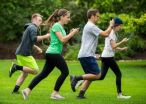(Press-News.org) For many people, finding motivation to exercise is a challenge. Thankfully, there are Zombies chasing you.
At least that's the approach of Zombies, Run!—one of more than 31,000 health and fitness apps on the market today, and one of the growing number of apps that use games to increase physical activity.
Gamification is currently the popular trend for mobile fitness app makers looking to cash in to help people get fit. Whether or not it's the best way to exercise remains to be seen.
"It's just been assumed that gamified apps will work, but there has been no research to show that they're effective for people long-term," said Cameron Lister, lead author of a new BYU study on gamified health apps appearing in the Journal of Medical Internet Research. "Does earning a badge on your screen actually change your health behavior?"
Lister, along with BYU health science professor Josh West, analyzed more than 2,000 health and fitness apps and found that the majority of the most popular and widely used apps feature gamification.
As part of their study, the duo also downloaded and used 132 of the apps personally to see how well they worked. In addition to Zombies, Run! they tried out:
Pact: An app that pits users against friends to see who keeps their exercise routine. Those who keep their goals make money at the expense of those who don't.
Fitbit: Users can enlist friends to help them reach goals by sharing stats, joining fitness challenges or competing on leaderboards.
DietBet: Like Pact, users put their money on the line to keep weight loss goals. Those who lose 4 percent of their starting weight in four weeks earn money from those who don't.
The researchers are concerned that gamification is ignoring key elements of behavior change and could be demotivating in the long run. For example, over time people can view the rewards and badges on these apps as work instead of play. Once the rewards disappear, the motivation drops.
One suggestion is for the apps to also focus on skill development.
"There's a missed opportunity to influence healthy behavior because most gamified health apps are only aimed at motivation," West said. "Motivation is important, but people also need to develop skills that makes behavior change easy to do."
According to the study, the most common form of motivation in the apps centered on social or peer pressure (45% of apps), followed by digital rewards (24%), competitions (18%), and leaderboards (14%).
"It's like people assuming that you hate health and you hate taking care of your body so they offer to give you some stuff in order for you to do what they want you to do," Lister said. "But really, you should intrinsically want to be healthy and be engaged in healthy activity."
While they found the health games are fun and engaging, West and Lister aren't sure they can sustain major changes in healthy behavior. They believe more research needs to be carried out in an industry projected to hit the $2.8 billion mark by 2016.
But funding for this type of research is scarce because the technology is so new and developers either don't have the money or are conflicted about subjecting their apps to scrutiny.
"I would caution developers and users to not have unrealistic expectations about the potential impact of gamified apps," West said. "Everybody wants to know if they result in more sustainable behavior change but we just don't know yet."
INFORMATION: END
Playing hunger games: Are gamified health apps putting odds in your favor?
New research shows prevalence, potential shortcomings of gamification
2014-08-22
ELSE PRESS RELEASES FROM THIS DATE:
TeleStroke units improve stroke care in underserved areas
2014-08-21
Using telecommunications to connect stroke experts to stroke patients in rural areas continued to improve and sustain stroke care, according to new research in the American Heart Association's journal Stroke.
This is the largest and longest evaluation of telemedicine for stroke and took place in rural Bavaria, Germany.
With the tele-medical linked Stroke Units, patients in regional hospitals had around-the-clock access to consultations with vascular neurologists at stroke centers, including evaluation of brain imaging and patient examination via videoconferencing when ...
Treatment for overactive bladder and irritable bowel syndrome advanced through pioneering research
2014-08-21
Researchers at the University of Surrey have discovered how the receptors responsible for contractions in the bladder, regulate the body's clock genes.
The new study, published today in The FASEB Journal, has found that this clock activity in turn regulates the cycle of all cells in the body. The team of researchers also discovered that the local biological clock and its control are weakened in ageing bladders, demonstrating the importance of the clock in bladder physiology and ageing.
While currently much is known about the central biological clock, little is known ...
Vision loss adversely affects daily function which can increase risk for death
2014-08-21
Bottom Line: Vision loss can adversely affect the ability of older adults to perform instrumental activities of daily living (IADL), such as using the telephone, shopping and doing housework, which are all measures of an individual's ability to live independently, and that subsequently increases the risk for death.
Author: Sharon L. Christ, Ph.D., of Purdue University, West Lafayette, Ind., and colleagues.
Background: Visual impairment (VI) can have negative effects on a person's physical and psychosocial health. VI is associated with a variety of functional and health ...
Surgery associated with better survival for patients with advanced laryngeal cancer
2014-08-21
Bottom Line: Patients with advanced laryngeal cancer appear to have better survival if they are treated with surgery than nonsurgical chemoradiation.
Author: Uchechukwu C. Megwalu, M.D., M.P.H., of the Ichan School of Medicine at Mount Sinai, New York, and colleagues.
Background: Approximately 11,000 to 13,000 cases of laryngeal cancer are diagnosed each year and squamous cell carcinoma accounts for the vast majority of these tumors. Prior to 1991, total surgical removal of the larynx with postoperative radiation was the standard of care for advanced cancer. Since then, ...
Shaping the future of nanocrystals
2014-08-21
The first direct observations of how facets form and develop on platinum nanocubes point the way towards more sophisticated and effective nanocrystal design and reveal that a nearly 150 year-old scientific law describing crystal growth breaks down at the nanoscale.
Researchers with the U.S. Department of Energy (DOE)'s Lawrence Berkeley National Laboratory (Berkeley Lab) used highly sophisticated transmission electron microscopes and an advanced high-resolution, fast-detection camera to capture the physical mechanisms that control the evolution of facets – flat faces ...
Fungus deadly to AIDS patients found to grow on trees
2014-08-21
DURHAM, NC -- Researchers have pinpointed the environmental source of fungal infections that have been sickening HIV/AIDS patients in Southern California for decades. It literally grows on trees.
The discovery is based on the science project of a 13-year-old girl, who spent the summer gathering soil and tree samples from areas around Los Angeles hardest hit by infections of the fungus named Cryptococcus gattii (CRIP-to-cock-us GAT-ee-eye).
Cryptococcus, which encompasses a number of species including C. gattii, causes life-threatening infections of the lungs and brain ...
Low birth weight linked to higher incidence of type 2 diabetes in African American women
2014-08-21
(Boston) — African American women born at a low or very low birth weight may be at a higher risk for developing type 2 diabetes. The findings, which appear in Diabetes Care, may explain in part the higher occurrence of type 2 diabetes in African American populations, which has a high prevalence of low birth weight.
Researchers from Boston University's Slone Epidemiology Center followed more than 21,000 women enrolled in the Black Women's Health Study over the course of 16 years, analyzing characteristics such as birth weight, current age, family history of diabetes, body ...
Enabling a new future for cloud computing
2014-08-21
The National Science Foundation (NSF) today announced two $10 million projects to create cloud computing testbeds--to be called "Chameleon" and "CloudLab"--that will enable the academic research community to develop and experiment with novel cloud architectures and pursue new, architecturally-enabled applications of cloud computing.
Cloud computing refers to the practice of using a network of remote servers to store, manage and process data, rather than a local server or a personal computer. In recent years, cloud computing has become the dominant method of providing ...
NASA scientists watching, studying Arctic changes this summer
2014-08-21
VIDEO:
In this animation, the Earth rotates slowly as the Arctic sea ice advances over time from March 21, 2014 to August 3, 2014.
Click here for more information.
As we near the final month of summer in the Northern Hemisphere, NASA scientists are watching the annual seasonal melting of the Arctic sea ice cover. The floating, frozen cap that stretches across the Arctic Ocean shrinks throughout summer until beginning to regrow, typically around mid-September.
As of Aug. 19, ...
Extracorporeal support can significantly increase number of organs for transplant
2014-08-21
Ann Arbor, Mich. — Using heart-lung support technology, the University of Michigan's Transplant Center was able to increase the number of kidneys, livers and pancreases available for transplant by about 20 percent.
The results were published in the journal Transplantation and detail the impact of more than 10 years of using Extracorporeal Membrane Oxygenation, or ECMO, to improve the quality and viability of organs donated after circulatory determination of death.
"Organ transplant is limited by the number of donated organs available, so the use of organs that are donated ...
LAST 30 PRESS RELEASES:
White House autism briefing linked to swift shifts in prescribing patterns, study finds
Specialist palliative care can save the NHS up to £8,000 per person and improves quality of life
New research warns charities against ‘AI shortcut’ to empathy
Cannabis compounds show promise in fighting fatty liver disease
Study in mice reveals the brain circuits behind why we help others
Online forum to explore how organic carbon amendments can improve soil health while storing carbon
Turning agricultural plastic waste into valuable chemicals with biochar catalysts
Hidden viral networks in soil microplastics may shape the future of sustainable agriculture
Americans don’t just fear driverless cars will crash — they fear mass job losses
Mayo Clinic researchers find combination therapy reduces effects of ‘zombie cells’ in diabetic kidney disease
Preventing breast cancer resistance to CDK4/6 inhibitors using genomic findings
Carbon nanotube fiber ‘textile’ heaters could help industry electrify high-temperature gas heating
Improving your biological age gap is associated with better brain health
Learning makes brain cells work together, not apart
Engineers improve infrared devices using century-old materials
Physicists mathematically create the first ‘ideal glass’
Microbe exposure may not protect against developing allergic disease
Forest damage in Europe to rise by around 20% by 2100 even if warming is limited to 2°C
Rapid population growth helped koala’s recovery from severe genetic bottleneck
CAR-expressing astrocytes target and clear amyloid-β in mouse model of Alzheimer’s disease
Unique Rubisco subunit boosts carbon assimilation in land plants
Climate change will drive increasing forest disturbances across Europe throughout the next century
Enhanced brain cells clear away dementia-related proteins
This odd little plant could help turbocharge crop yields
Flipped chromosomal segments drive natural selection
Whole-genome study of koalas transforms how we understand genetic risk in endangered species
Worcester Polytechnic Institute identifies new tool for predicting Alzheimer’s disease
HSS studies highlight advantages of osseointegration for people with an amputation
Buck Institute launches Healthspan Horizons to turn long-term health data into Actionable healthspan insights
University of Ottawa Heart Institute, the University of Ottawa and McGill University launch ARCHIMEDES to advance health research in Canada
[Press-News.org] Playing hunger games: Are gamified health apps putting odds in your favor?New research shows prevalence, potential shortcomings of gamification





